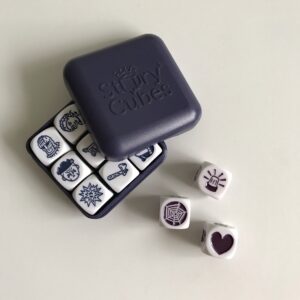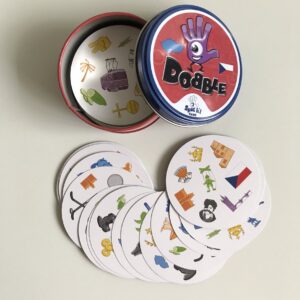There are many ways to integrate games into your study routine. In this post I will write about ways which can help you turn your passive knowledge into active practice.
Storytelling – with a twist
Sometimes it is hard to come up with story ideas or topics on our own for language practice – especially if you are not a creative person. I find it challenging to just sit down and write a journal, the only thing which I try to write about is usually my day. But there is a solution for this dilemma! There is a game called story cubes. These are dice with pictures on every side, and by rolling, they give you actions, topics or characters to talk about. You roll and then try to tell a story (or just start a story) based on the pictures you see. There are many types of it, even cartoon topics or special sets with only actions (I have the Dr. Who set and the crime set). It is really versatile: playable alone or in group, you can practice speaking or writing. Of course it is more fun when you have other people to play with, but it can still make your practice more enjoyable, when you are learning alone.

There are card games with similar ideas, which can help you practice speaking. A good example could be the Gloom card game (it is best if you have a strong english knowledge, as the cards have texts on them, which are sometimes quite specific).
Games for kids in a new role
Speaking of cards: there is a game called BrainBox, which is originally made for kids to learn new words and practice picture recognition and picture description. But because of its versatility, you can use it really effectively to practice your target language! It is a set of cards (packaged by topics, such as animals, transportation, nature, etc.), and by the original game, you should watch the picture on one side and then you have a set of questions on the other side regarding the picture. You need to answer them correctly to get the card. But! Since it is picture based, you can use them as flashcards or simply practice picture description by yourself.
We played it with my friends (with a time constraint) and it was so fun! The goal was to collect as many cards as possible by answering the questions correctly (ex.: how many birds are on the picture? Did the truck have yellow or red doors? Are there palm trees? etc.). This helped us learn new words and speak about specific topics.
A much quicker – and maybe harder – game for vocab practice is Dobble. Same thing here: you can buy many variants of this with a topic (Harry Potter, Česko, beach edition, cartoons, etc.), so it will not be boring. However, it has a specific vocabulary which you need to learn – based on the pictures of the cards. There are many ways to play this game, and you can come up with even more if you would like. If you are alone, then you can use it for storytelling as well: based on only one card (which has many pictures on it), you can start a tale – including everything you see on the card. With friends, you can go one after another, everyone saying only one sentence with one word from the card – you need to compose a story together.

Regarding picture description, there is another game which could be used for this purpose: Dixit. It is a card game with painted pictures – and no written description on the cards. Perfect for storytelling, vocab practicing or using as flashcards. The scenes are beautifully painted and it has so many expansion packs already, that it will never get boring. Plus, it is quite a popular game, so aside language learning, I bet your friends would enjoy it too!
Wordplay and vocab building
One of my favourite games is scrabble – a game known in different names in many countries. It is a game played with letters, and the main goal is to make longer and more complicated words than your opponents and get the most points for them. I loved to play this game with my family when I was a kid, and now I like to try it in different languages. Last christmas I played it in czech with my friends – I really enjoyed it and learned some new words. Of course, this is not a beginner game, as you need to have at least a base vocabulary and knowledge of how the language works (how you create adjectives from nouns, conjugation and so on).

Further inspiration
You can find plenty of ideas for games online! But if you want an offline inspiration, then go to the bookstore or a toy shop and look around. The games for kids in the age 4-10 are usually good for learning about your environment or family, and they help with vocab building and practice. These are games for elementary school kids, so they have plenty of new things to learn – and you can follow their path in your language learning journey, too.
What games do you like to play? Which games do you use for learning purposes as well? LEt me know in the comments!
